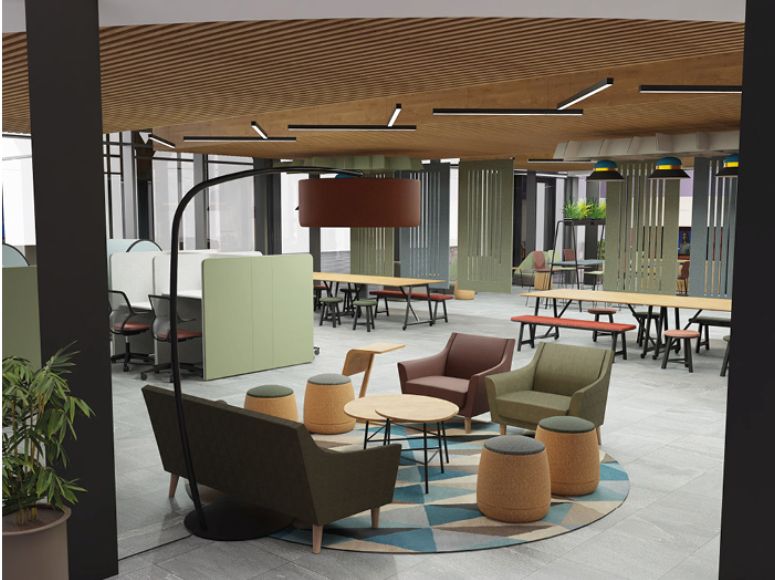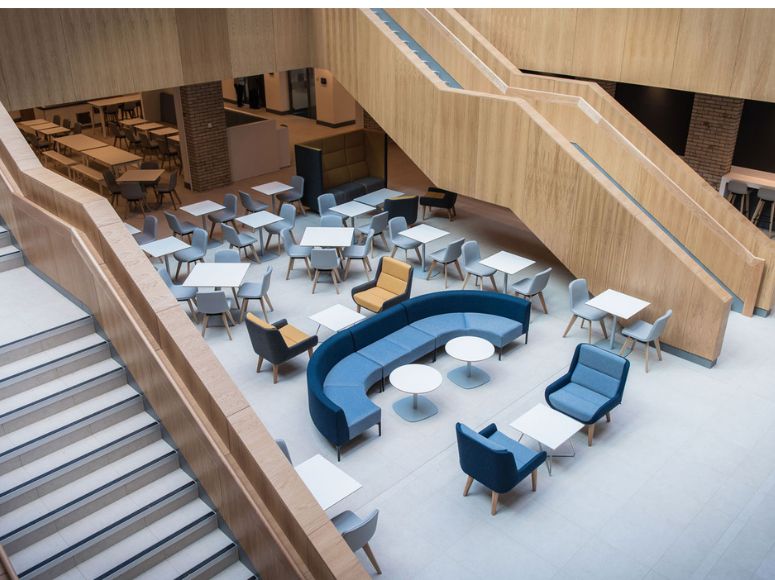
At Southerns Broadstock Interiors we work closely with your organisation and your people to ensure we deliver a solution that creates a space uniquely tailored to your needs. Acting as a supportive resource, we bring our expertise in furniture procurement to the table, enhancing your capabilities.
From the initial stages, we function as partners in your furniture procurement journey, offering the necessary expertise and insight to create environments that support and inspire the growth and success of every student and staff member.
Our comprehensive approach begins with understanding your values and aspirations, allowing us to tailor a solution that aligns with your goals. Through consultation, design, and delivery, we provide a bespoke package of services to transform your space and assess the impact of your investment. Our focus extends beyond just furniture selection.
Most dieters will know that counting calories alone doesn't make you thinner and healthier. Similarly, carbon assessment has many considerations. In 1987, the United Nations Brundtland Commission defined sustainability as "meeting the needs of the present without compromising the ability of future generations to meet their own needs."
There must, therefore, be a greater focus on the impacts and approach to estates management. Society has, over the last decades, adopted a ‘throw away’ culture with little regard to the consequences. There needs to be a re-think: how can we maximise the useful life of valuable materials and protect natural ecosystems? An estimate from the 2021 Circular Gap Report claims that a circular economy could reduce global greenhouse gas emissions by 39%. Similarly, protecting and restoring biodiversity is crucial to addressing climate change.
The measurement of Scope 1 and 2, or operational, carbon emissions is usually the first hurdle. Effective monitoring and recording techniques make these relatively easy to measure and potentially reduce. The introduction of smart building technology with sophisticated controls is having a positive impact on energy efficiency. The decarbonisation of the National Grid and investments in renewables is also reducing reliance on fossil fuels. Reporting Scope 3 emissions is a far greater challenge. They typically include the majority of an organisation's carbon footprint incorporating the environmental impact up and down the value chain.
The 15 categories of Scope 3 reporting detail the numerous factors influencing a university’s full climate change impact. Purchased goods and services, capital goods, transportation and distribution, waste in operations, business travel, employee commuting, franchises and investments are some of the areas requiring scrutiny.
Furniture and equipment may appear to be inconsequential but have a direct effect on Scope 3. The embedded carbon is significant, and all too often, these products are discarded as waste. Research indicates over the lifespan of a building, F,F&E (Furniture, Fittings & Equipment) is responsible for 30% of the carbon impact. An office task chair alone, for example, has a carbon footprint of circa 70kgCO2e, and if sent to landfill there’s a further 10.5kgCO2e consequence.
Interventional measures are necessities. Reuse of existing assets offers opportunities for financial and carbon savings. Designers must be tasked with finding solutions that integrate reuse with new whilst achieving the design intent - without discarding quantities of furniture as waste. This is a big ‘ask’ but can be achieved when combined with storytelling to communicate a powerful message to staff and students.
The growing interest in reuse and repair is undoubtedly influencing opinions. There is recognition that we cannot always expect ‘shiny and new’ without incurring the ‘carbon’ consequences.
Asset management is fundamental – tracking, condition scoring, repairs, maintenance including cataloguing and storage for subsequent reuse. Refurbishment, upcycling and remanufacturing can also contribute to lifecycle extension.
The ever-increasing pressure on financial budgets is often resulting in purchasing decisions based primarily on price. Focus should include embedded carbon measurement, durability, repairability, design for disassembly and more timeless aesthetics. Reuse can release additional funds but could more centralised budgets, together with amortised costings across accounting years, allow specification choices to be based on quality and environmental impact rather than just price?
Carbon reporting and reduction is a necessity for the Higher Education sector. Whilst challenging, it is an essential requirement. The last few years have demonstrated the devasting effects of climate change. The more we use methods of decarbonising to reduce our global greenhouse gas emissions, the more likely we are to be able to protect ourselves and future generations.
Joanna has over 30 years’ experience in the furniture and interiors sectors. She is also a non-executive director at the Furniture Industry Research Association; a member of the advisory committee at the Furniture Industry Sustainability Programme; and co-founder of the Sustainable Design Collective, a think tank group of workplace architects and designers.
The guiding principle of inclusive design is to level the playing field for everybody regardless of their situation. This is based on the simple rule that designing for the widest range of people creates robust, innovative solutions that will therefore, benefit everyone.
Human beings are diverse, as is their behaviour, and through inclusive design we have the power to break down barriers and exclusions. We need to identify these barriers and understand what they are in detail by engaging with end users and analysing that information alongside the constraints and opportunities of the area in scope.
By integrating inclusive design principles from stage 0, providing the narrative required for stakeholder buy-in, and demonstrating the value added by the strategy and solutions provided, we can build an environment that offers dignity, confidence, convenience and comfort for all users.


Neurodiversity – it covers a range of conditions – from autism to ADHD, dyslexia to dyspraxia, and beyond. The definitions are helpful but never forget that even within one condition, one size most certainly doesn’t fit all - to think in terms of the average is very misleading and ultimately very dangerous.
We’ve come a long way since the days of dismissing someone with dyslexia as being thick or a person with ADHD as being awkward. But we can’t sit back and think we’ve cracked it. For whilst we largely recognise and respect peoples’ conditions we haven’t designed and built working environments to help those with neurodivergent personalities get the most out of themselves.
However you choose to view that community – 15%, or 3 in every 20 people, or whatever works for you that’s an awful lot of folks feeling excluded by environmental design which just isn’t flexing to accommodate their needs.
Sustainability and carbon measurement are rapidly becoming priorities for universities. Yet inflationary pressures, the tuition fee cap and falling international student numbers are squeezing budgets.
Effective asset management and maximising the useful life of FF&E can not only have a positive impact on Scope 3 carbon measurements but also offer financial savings, marketing opportunities and social value benefits.
The incorporation of intelligent asset registers, condition monitoring and maintenance can maximise the lifecycle of furniture. It enables Estates Managers to make more informed and precise decisions about reuse opportunities, replacement cycles and disposal routes. Reuse and upcycling can offer further benefits through student participation and local, social value involvement.
Great student accommodation is not only instrumental in creating the best possible student experience but has been highlighted as a vital revenue source for universities and a powerful marketing tool for boosting student recruitment.
Demand continues to grow in the sector, and it is essential that universities retain and build upon their market share through refurbishment, remodelling and new build projects.
We’re on a mission to join the dots across campus to ensure the experience is consistent and human centred, fostering inclusivity, wellbeing and community, whilst providing a platform for academic success.
We’re proposing a collaborative research piece, and want to engage with AUDE members, their University and Students to develop a deeper, joint understanding of this opportunity, the need for change and to establish the expectations of a modern “Home away from Home”.
When revisiting an existing space, it’s essential that we utilise the design process in its entirety to explore every opportunity and unearth every constraint. The design journey is not a straight line, it often has twists and turns along the way and without addressing these diversions, applying thought and finding clarity, spaces can quickly become underutilised or branded unsuitable for their proposed use.
Our tried and tested process combines 9 key elements from concept completion, minimising risk and offering narrative for decision makers and end users:
Scoping and Familiarisation > User Centric Evaluation > Progress Reviews > Engage All Audiences > Get Creative > Test the Idea > Finalise the Design > Shape the Future
Buy engaging early and offering post occupancy support, we are able to create spaces where the success is measurable, and the learnings can be applied to drive future campus improvements.

Leveraging the Circular Economy for Sustainability and Cost Savings - view the webinar
Exploring Inclusive Environments - view the webinar
Ashley Hayward - CEO - ashley.hayward@southernsbroadstock.co.uk - 07471 991857
Pete Terry - Chief Customer Officer - pete.terry@southernsbroadstock.co.uk - 07764 693773
Lynsey Taylor - CFO - lynsey.taylor@southernsbroadstock.co.uk - 07816 100023
Daniel Sales - Regional Sales Director - daniel.sales@southernsbroadstock.co.uk - 07816 100024
Hayley Migliaccio - Sales Process Director - hayley.migliaccio@southernsbroadstock.co.uk - 07792 987681
Lee Hansford - Head of Creative Design & Marketing - lee.hansford@southernsbroadstock.co.uk - 07768 101563
Joanna Knight - Sustainability Lead - joanna.Knight@southernsbroadstock.co.uk - 07768 644286
Mark Minogue - Bid Manager - mark.minogue@southernsbroadstock.co.uk - 07775 722081